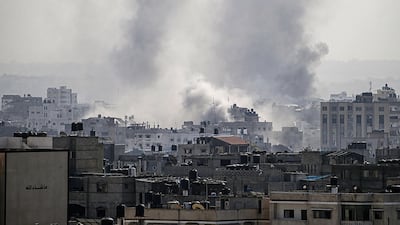Live updates: Follow the latest news on Israel-Gaza
Negotiations to strike a limited prisoner exchange deal between Israel and Hamas and allow more humanitarian aid into Gaza are advancing “slowly”, Egyptian officials told The National, as mediators try to balance the “high expectations” of both sides.
The talks are centred on the release of up to 50 elderly people and children from among the 200 hostages held by Hamas in Gaza. In return, Hamas wants Israel to allow significantly more humanitarian supplies into the besieged Gaza Strip and to release Palestinian women held in Israeli prisons.
A Hamas delegation arrived in Cairo on Monday to help break the deadlock in the multitrack talks involving Egypt, Israel, Hamas, Qatar and the US as well as representatives from the UN and the International Red Cross.
The officials also told The National that Cairo had reached out to Iran, Hamas's main backer, in the hope of achieving a breakthrough. Egypt's relations with Iran have recently thawed after decades of tension.
However, they said the talks were progressing slowly, with both Israel and Hamas sticking to their demands in full, and Israel appearing to be preoccupied with its expanding military ground operations in Gaza.
Speaking on condition of anonymity, the officials said Israel was adamant it would not allow fuel into Gaza as it feared it would be used by Hamas for military purposes.
Israel is also demanding that Hamas releases all civilians among the hostages, not just the elderly and children, said the officials. A much larger prisoner swap would be negotiated at a later stage, they added.
“Hamas's expectations are high after it gave Israel its bloodiest day in its history on October 7,” said one of the Egyptian officials. “It's talking about all Palestinian prisoners held in Israeli jails released in exchange for the hostages it has. It's a tall order, but one that Israel may eventually agree to given the large number of hostages Hamas has and the pressure of their families.”
A source at Qatar's Foreign Ministry confirmed to The National that the energy-rich Gulf nation was involved in quiet diplomacy, mediating between Hamas and other parties, and likewise said that the negotiations were proceeding slowly.
“The Qatari foreign ministry works best if it quietly handles the details among parties so this is why you will not be seeing us release any updates or details on the deal to the media or public until we can confirm something solid has been agreed to,” said the source.
The source, who spoke on condition of anonymity because he was not authorised to brief the media, said Qatar’s main goal has been to secure the release of hostages.
Confidence-building measures, he explained, must be taken “to get those in Gaza to release women and children first, and then we can plan for a wider swap involving the rest,” he said.

US pushing for release of Americans
The US is pushing Egypt to allow an estimated 500 US passport-holders to leave Gaza via the Rafah border crossing with Egypt, the Egyptian officials said.
They said Cairo's position is that it will allow the US nationals to leave only if an agreement is reached between Israel and Hamas on a truce, wounded civilians are allowed in to Egypt for medical treatment, and Israel lets more aid, including fuel, into Gaza.
Thousands of tonnes of humanitarian aid, including food and medical supplies, have been shipped to the Egyptian coastal city of Al Arish in Sinai, but Israel has only allowed in small amounts via the Rafah border crossing.
The aid has mostly been food, water and medicines and did not include fuel, despite the UN warning its aid operations desperately needed fuel to function.
Washington has publicly reiterated its support for Israel's military campaign in Gaza and resisted calls for a humanitarian ceasefire.
Egypt, which borders both Gaza and Israel, has played a key mediator role in the region since signing a peace deal with Israel and becoming a US ally in 1979.
The government of President Abdel Fattah El Sisi has also forged a working relationship with Hamas and other militant groups in Gaza, despite outlawing the like-minded Muslim Brotherhood at home.
Egypt's government fears the conflict in Gaza could spill across the border into the Sinai Peninsula, where it has fought a long-running insurgency by militants with a similar ideology to Hamas and its Gaza ally Islamic Jihad, which is also backed by Iran.
Egypt is also alarmed that if Israel continues to bombard Gaza and intensify its ground offensive, many of Gaza's 2.3 million residents could be forced to flee across the border, which Cairo has said would contribute to the “liquidation” of the Palestinian cause.
Israeli infantry and tanks remained in Gaza on Monday night, despite the UN General Assembly voting for an immediate ceasefire over the weekend.
More than 8,000 people have so far been killed in the Israeli bombardment of the coastal enclave and nearly half of Gaza's residents have been displaced as aid agencies warn of a major humanitarian crisis.
The National's Arab Affairs Editor Ismaeel Naar contributed to this report from Abu Dhabi


